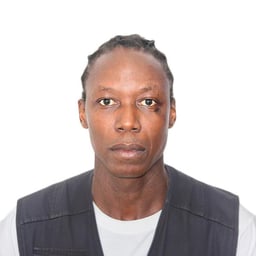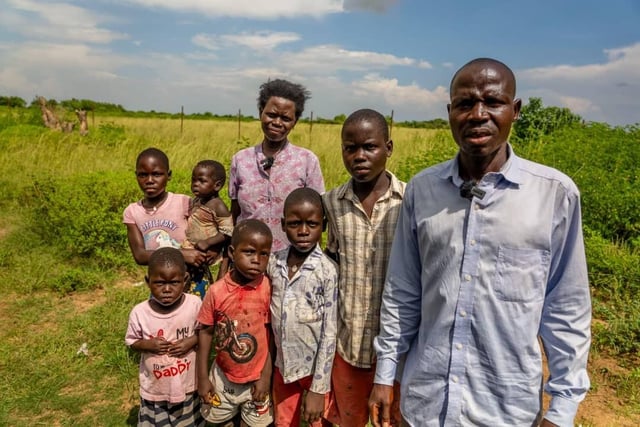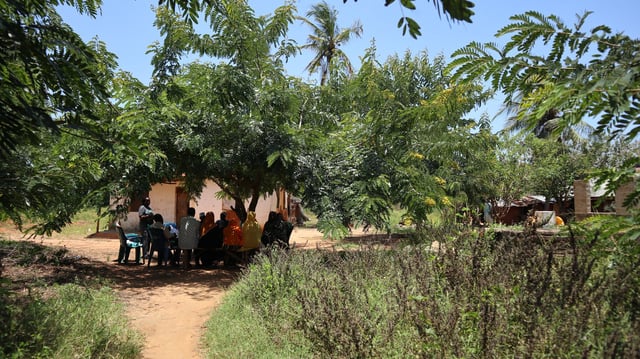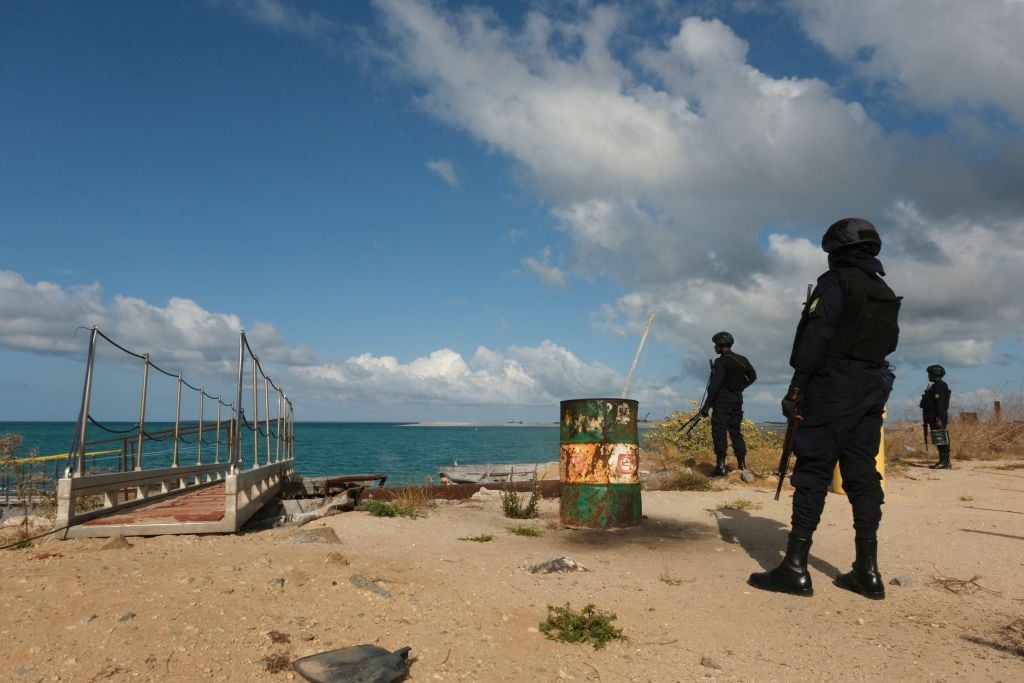
Photo: Rwandan policemen guard The Total Mozambique LNG Project in Afungi in the Cabo Delgado province, Mozambique, on September 29, 2022. Photo by Camille LAFFONT / AFP via Getty Images.
It was March 2013. I woke up in Pemba, where gas prospecting was going at full speed. Sparkling like Christmas trees, lights of all colors arrived at the port of Pemba in Cabo Delgado, ships of every size. Engines roared with joy through the streets, employees walked around with full pockets, new buildings to accommodate the gas staff were popping up everywhere like mushrooms. Entrepreneurs threw their millions into the construction of hotels, houses, and apartments. The gold rush long promised by Mozambique’s trillions and trillions of cubic meters of offshore gas was here.
Bars, restaurants, and nightclubs were filled with people from almost every walk of life. Sex workers had a guaranteed market along Wimbe beach. Every type of equipment from tubes and ducts to tractors and cranes were being unloaded every day off of planes or ships. The forest was cleared in concessions to development and the fossil fuel boom.
But it wasn't long before 'El Dorado'—the promised land, the gold rush—began to reveal itself as less of a utopia and more of a battlefield. In communities throughout Cabo Delgado, thousands of people began to see their lands expropriated at all costs; some were beaten, others shot or buried alive, their hectares of land taken in exchange for 20-to-30-meter squares of useless land in the middle of nowhere, miles away from the farmland or prime fishing spots that had long been their livelihood. The government began to look like more of an extension of industry than a civil institution, protecting large corporations and criminalizing those who demanded their rights. The expansion of corporate power and the shrinking of civic space became more evident every day. As insurgents took over then retreated, then took over again, the government kept promising that everything would be okay, and that gas would deliver us all a better, brighter future.
Key to this endeavor was a small group of consulting firms formed by a handful of elites with ties to both the government and the multinational corporations invested in Mozambique’s gas boom. In a project so complicated, with so many different social layers, consultants might be linked to a university, a consulting firm, an NGO, or all three.
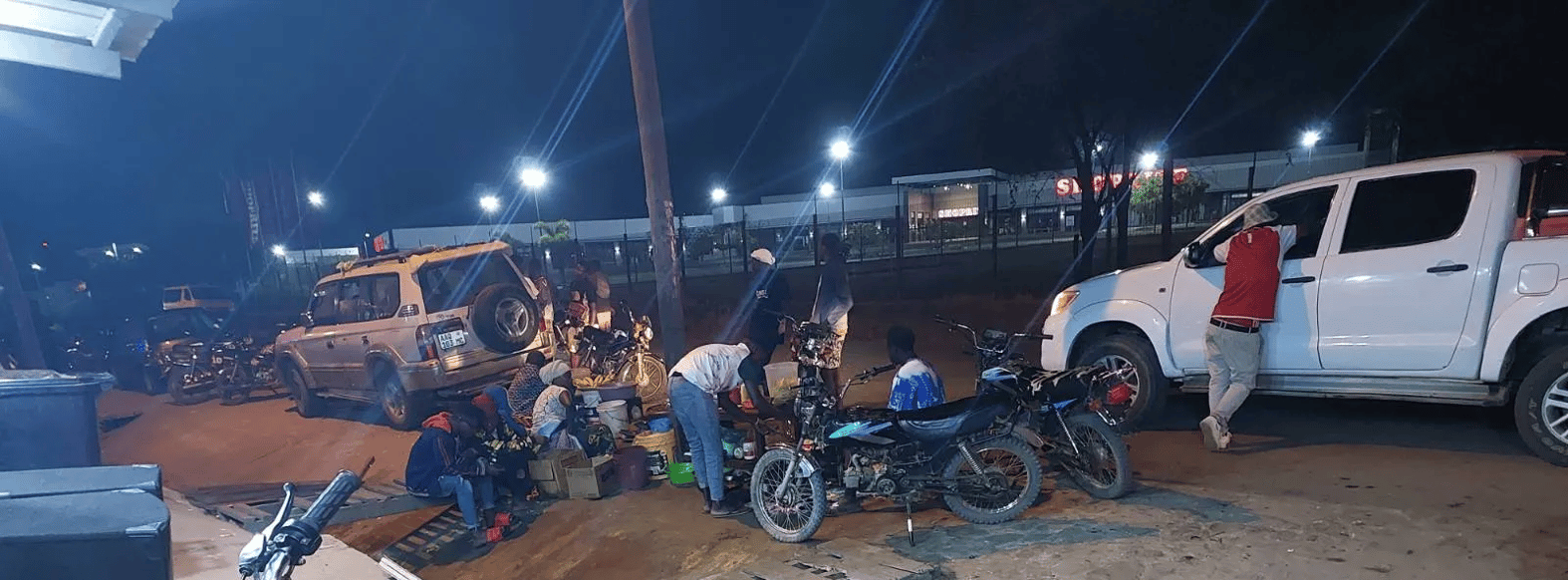
A typical night in Pemba. Photo: Estacio Valoi.
Cash for consultants
Under Mozambican law, environmental and social impact assessments (EIAs) are mandatory for extractive projects. Projects require an environmental license as a prerequisite to begin, and an EIA is required to secure that license. The EIA for the Liquefied Natural Gas (LNG) Project Offshore of the Rovuma Basin, off the coast of Cabo Delgado, was produced by the South African subsidiary of a London-based firm, Environmental Resources Management (ERM) on behalf of the U.S. gas company Anadarko and Italian oil giant Eni. At the time, Anadarko was leading the Mozambique LNG Project; it sold its stake to Total Energies in 2019.
ERM has multiple clients in the oil and gas industry and is the environmental assessor of choice for some of the world’s oil and gas majors, including ExxonMobil. ERM has previously faced multiple conflict-of-interest scandals. In 2013, Friends of the Earth US accused the company of conflict of interest when it was hired by the U.S. government to assess the environmental impact of the Keystone XL pipeline project while also maintaining contracts with the pipeline projects’ owners, TC Energy. More recently, in Guyana, ERM was criticized by environmentalists after hiring experts who had previously worked with ExxonMobil to conduct environmental impact assessments on the company’s future extraction projects. In 2021, private equity fund KKR acquired a majority stake in ERM; KKR previously held a stake in various Anadarko projects. It also holds the majority stake in TC Energy’s largest gas project, the Coastal Gas Link project in Canada as well as several oil and gas projects around the world. In April 2024, a report from the nonprofit consortium Private Equity Climate Risks found that KKR is invested in nearly 200 fossil fuel assets worldwide, emitting roughly 93 million metric tons of greenhouse gases annually, or 6,500 times the emissions the firm has disclosed.
Conflict of interest charges have been leveled at ERM in Mozambique, too. Kamal Govender, an ERM project manager who coordinated the EIA for the proposed LNG project, for example, went on to be employed as a Health & Safety representative working on the Mozambique LNG Project for Anadarko Petroleum Corporation, and as Senior Environmental Advisor on the Mozambique LNG Project for TotalEnergies.
“ERM is committed to maintaining the highest standards of integrity and transparency in our work, which includes providing impartial, objective and evidence-based Environmental and Social Impact Assessments based on our technical expertise,” Meryl Hanlon, PR and Brand Communications lead for ERM told Drilled in an emailed statement. ”We reject the assertion that former ERM employees were engaged in conflicts of interest while carrying out ERM projects.”
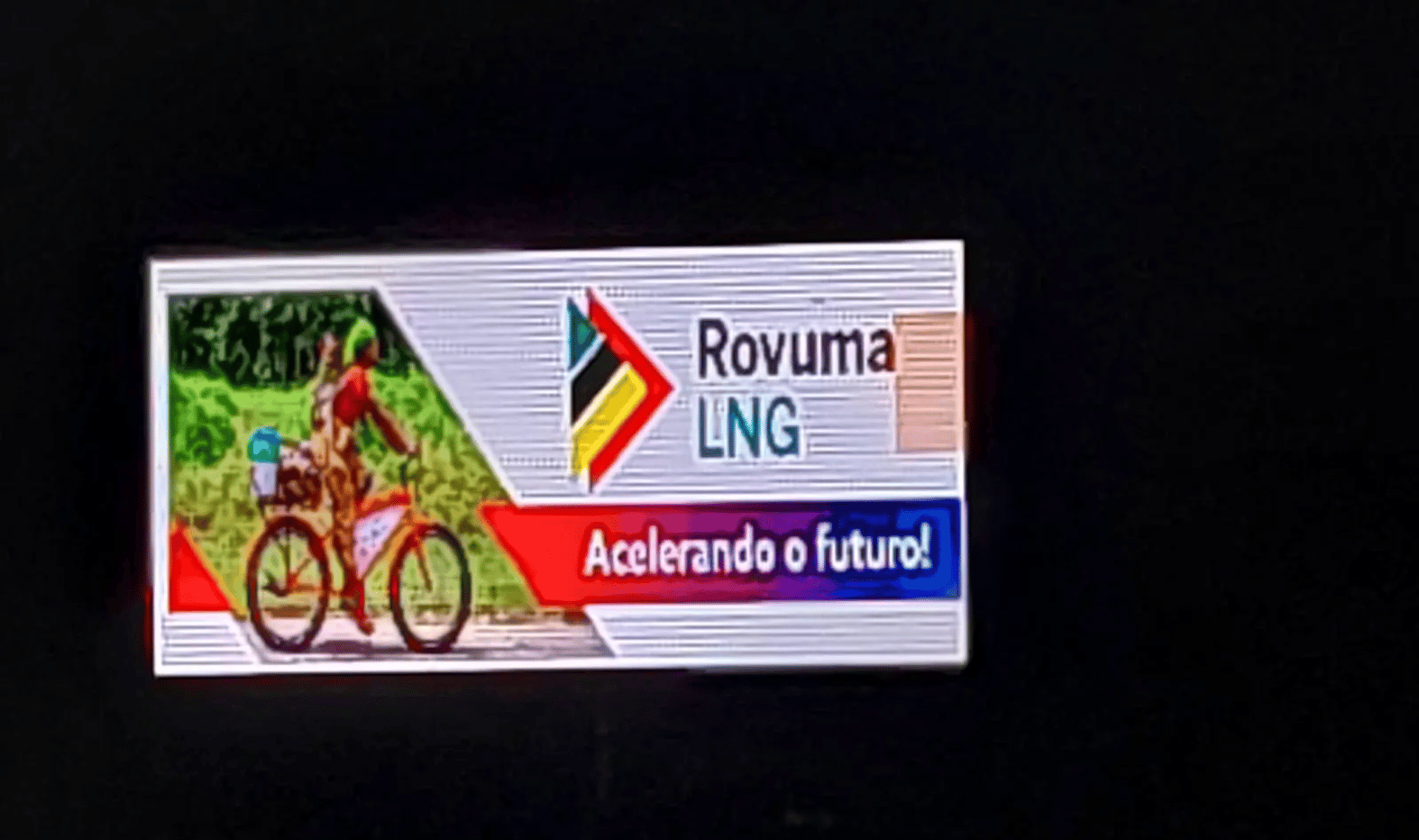
A billboard advertising the LNG project in Pemba, Cabo Delgado. Photo: Estacio Valoi
Then there are the research consultants who provide information to potential investors. Institutional Shareholder Services, for example, a proxy advisory firm headquartered in the United States, plays a key role in sharing information with institutional investors, sourcing its information from tens of thousands of media outlets, filtered by AI-assisted analysts. In a September 2024 report entitled “Paid for Approval,” Mozambican civil society group Justiça Ambiental wrote: “The searches are not neutral. There are clear selection criteria and a lack of transparency surrounding what is included and excluded from these searches, which can heavily affect the results.”
Research from Justiça Ambiental and Afrikagrupperna into Scandinavian pension funds found that the vast majority of these funds, many of which use ISS as one of their consultants, did not know there were any issues associated with the Mozambican gas project, despite news stories since 2012 about communities enraged by the resettlement process, oil spills, and, of course, various terrorist attacks on or near the LNG facility itself.
LKL International Consulting, a Montreal-registered company, was the service provider commissioned by TotalEnergies to produce its human rights due diligence assessment. One of the assessment’s authors, Lloyd Lipsett, is a human rights lawyer and one of the consultancy’s directors, and has previously publicly defended the mining company Nevsun Resources against allegations of human rights abuses in Eritrea. Lipsett most recently appeared as an advisor to the East Africa Crude Oil Pipeline project (both EACOP and Mozambique gas projects are funded by multiple common financiers, such as Standard Bank, and led by TotalEnergies).
In its “Paid for Approval” report, Justica Ambiental notes that Conningarth Economists, an economic research consultancy firm based in South Africa that has provided various macroeconomic research studies into the prospects of LNG in Mozambique on behalf of Standard Bank, a key financier, has produced studies that “tend to greatly underplay risks and over-emphasize the potential economic benefits for all of Mozambique’s LNG projects, offering bold figures that can be used by banks, state actors and fossil companies themselves.” Connigarth’s study examining the Rovuma LNG Project, for example, confidently affirms that “the Project makes sense for Mozambique because it offers a win-win for the government of Mozambique and Mozambique Rovuma Ventures’ future Domgas Projects, and civil society.”
Conningarth have collaborated with multiple utilities, extractive corporations and fossil fuel companies, including a recent macroeconomic study commissioned by the Tanzanian government that affirms the benefits of LNG investments in Tanzania.
Local consultants are key
It’s not just international consultants who are feasting off of Mozambique’s gas boom.
Gaye Thompson with SCDS and Joana Martins with SCDS, VAMOZ and TAG, are two local consultants that have been deeply involved with the gas project as well, particularly during the prospecting and resettlement processes in the district of Palma. Although Thompson was let go from the project in 2021, she was one of the advisors to Anadarko and provided consulting services at the start of Total’s takeover of the project, particularly around the Mozambican aspects of the resettlement planning and the early implementation of that program. One of her areas of focus was community impact. The resettlement process involved some two thousand families that were being asked to move out of the way of the LNG project. Martins also worked for SCDS during this time, as well as for VAMOZ, which positions itself as a group of volunteers working on humanitarian causes, but has also worked directly for TotalEnergies. To this day communities complain about resettlement processes that left a lot to be desired.
Thompson claims she has never worked with VAMOZ. “I have never worked with VAMOZ at all,” she told Drilled. “I was not in Palma when VAMOZ was working there and have not had anything to do with the program. SCDS had independent teams on different projects.”
However, TotalEnergies’ 2023 report on human rights in Cabo Delgado notes: "Ties between VAMOZ and SCDS are close. The VAMOZ coordinator is also the director of the SCDS. Volunteers are paid by the company."
Two of Thompson’s former employees, who asked to remain anonymous to protect them from retaliation, told Drilled that VAMOZ and SCDS are essentially the same organization with different names. Martins’ LinkedIn profile, which lists her jobs at SCDS and VAMOZ as concurrent, supports this claim, and both Thompson and Martins confirmed that Martins works for both SCDS and VAMOZ, and has done so since VAMOZ began, including during the consultancies’ work on the oil companies’ resettlement plan. According to the former employees, SCDS works more with corporations and organizations while VAMOZ works as a humanitarian organization, collecting and distributing money and basic necessities, and assisting with logistics (including evacuation) for the communities of Cabo Delgado.
According to Martins, “VAMOZ group does not receive money directly by anyone,” but rather accepts in-kind donations of logistics support, fuel, food, and personnel. However, according to TotalEnergies’ report on the socioeconomic, humanitarian and human rights situation in Cabo Delgado, VAMOZ has close ties to the oil company. “In the coordination meetings, different persons with different functions appear to represent the [LNG] project: safety representatives, delegates from the operators (VAMOZ, MASC) and even, sometimes, members of the communications department, present themselves as the ‘humanitarian branch of TotalEnergies.’”
VAMOZ once operated all over the country, but is now almost exclusively operating in Cabo Delgado. Former SCDS employees claim that the two organizations, which have been tasked with overseeing resettlement and community outreach for the oil major, “even have program managers based in Portugal” though they are supposed to be doing community work in Cabo Delgado. “How much do they receive for doing community work in Palma when they are in Portugal?” one former employee asked.
Martins said VAMOZ volunteers “may support remotely or in person, depending on the mission. The decentralized and flexible structure is a key strength, not a limitation.”
Side Hustle
It's increasingly common in Cabo Delgado to see organizations that once advocated for communities living in areas where Total is developing or exporting gas now receiving funds or other forms of support from the company itself. In fact, the overlap between advocacy and consultancy seems to be quite common in Cabo Delgado. The line between academics, organizations and advocacy that claim to be in favor of the community and consultants working for oil companies is very thin and sometimes invisible. According to former employees as well as Cabo Delgado community members and advocates, it’s not uncommon for consultancy firms ostensibly hired to do community outreach to ‘convince’ or ‘pressure’ the communities to accept the terms offered by the multinationals, warning that they might be left out of the compensation process altogether if they do not accept.
Communities often welcome into their midst those who claim to be defending their interests but are actually working for multinationals. “Many of these multinationals need a specialist to carry out their analyses and give them advice so that they can then deal not only with the risk but also have some credibility,” Daniel Ribiero, Technical and Research Coordinator at the environmental organization Justiça Ambiental. “And many of the consultants, in one way or another, end up being paid by Total through investors or another component linked to Total. Basically, there ends up being a group that is the ‘think tank,’ the academic or technical part that helps to create and provide arguments for the project.”
After years of the Mozambique LNG project being on pause, it looks to be resuming again this year. In March, the U.S. Export-Import Bank approved a $4.7 billion loan to the project, which analysts have called critical to unlocking the rest of the financing needed to complete it. The loan came on the heels of TotalEnergies’ president Patrick Pouyanné making various statements in support of the U.S. government to European press and politicians. Total has long boasted that it is the number-one exporter of U.S. LNG to Europe. In February, Pouyanné said he was doubling down on investments in U.S. LNG, dismissing concerns over the tariffs President Trump has proposed on European goods. He also urged European leaders to sign a free-trade guarantee on U.S. LNG, and urged Trump to commit to guarantee exports to Europe. In its press release announcing the loan to support the Mozambique LNG project, the U.S. Export-Import Bank highlighted the number of jobs the project would secure not for Mozambicans but for Americans.
“The transaction will support an estimated 16,400 good-paying American jobs which support workers and families at more than 68 companies across 14 states including Texas, Louisiana, Oklahoma, New York, Pennsylvania, Georgia, Tennessee, Florida, Illinois, South Carolina, New Jersey, California, Nevada, Colorado and the District of Columbia,” the release reads.
TotalEnergies did not respond to multiple requests for comment.
On a recent Wednesday night, at around 11pm, I stood at a tent at the edge of the road buying a bottle of wine. Suddenly a voice asked for a cigarette; without looking behind me I stretched out my arm with a cigarette, and lit it. Then, curious to see this person, I turned and saw a mother and her young daughter. I asked what the girl, who was around 14 or 15 years old was doing out so late on a Wednesday and the two responded, with a mix of melancholy and sarcasm, “sex work.” As I turned to go, I spotted an ad for Rovuma LNG. “Energy lives here! Accelerating the future!”
LNG promised Mozambique a future. All that remains is the hunger of that child.
